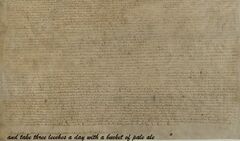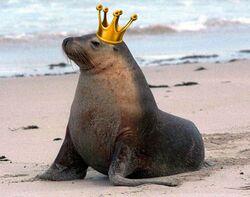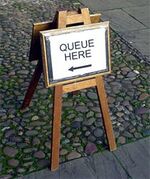Magna Carta

“The seal likes it!”
“... something smells and we all had a bath last month.”
The Magna Carta is a document written in medieval Latin which was presented to King John of England to sign and deliver to an assembly of nobles and clergy in June 1215. John agreed to pay a fine of £5.00 and put his seal on the document. The seal's name is not recorded but the smell of raw herring can still be detected by anyone who shoves their nose closer to the document.
A matter of trust[edit]
So, you may ask, what brought about the conflict between King John and his fellow aristocrats? Well, John had got the reputation of being a somewhat untrustworthy little shit. He had once been his father King Henry's favourite son, but had a knack of losing friends and influence. He had been given Ireland to rule, but had screwed that up and then tried to keep his brother Richard the Lionheart in a German jail when he was busted by the Holy Roman Empire's customs police for trying to smuggle in fake holy relics. To top it all, John had lost most of his lands to the French king Philip and then stole another man's bride. The nobles put their pointy-shoed feet down and said (in both French and Latin), Merde!! and stercore!!! King John was told to get his royal ass to a meeting or face rebellion.
So what's this all about?[edit]
Scroll back to the Middle Ages. No iPads, no Internet. And if you wanted to send a text message, you first had to skin an animal and clean it.[1] Since John didn't want his expensive stationery wasted on commoners, the Magna Carta was written on the back of a live goat by an agile scribe. Only when both sides had agreed to the terms was the goat butchered and served as that night's main course. The skin was saved and then transcribed onto other goats, which were slaughtered to make copies.
To give the document a bit more gravitas than "Something WE Agreed To", chroniclers named it Magna Carta. This would later lead to confusion amongst England's peasantry; they believed Magna was a woman who had made the King agree to stop being a thieving royal bastard. Prayers were offered to her, and there was even a petition to posthumously make her a saint. That no one knew where or when she died led to some fantastic stories about Magna's going on a crusade to liberate ... something from ... somebody ... Anyway the Catholic Church objected — not on the grounds that Magna didn't exist, but that the English had been a bunch of ignorant oinks to have made King John sign anything without their approval.
- Tea to be drunk at precisely 4 pm.
- Four-poster beds to be equipped with thick curtains.
- No man is an island.
- No fishing after dark.
- Queuing mandatory.
Other clauses were written so densely that no one could decipher the scribe's handwriting. The fishing clause caused a lot of arguments. Some wondered if this provision also covered crabs, crayfish, and winkles. After much debate, they were excluded and given to King John's seal.
Rumble at Runnymede[edit]
King John had hoped that his mercenaries would surround Runnymede and kill all the traitors. Except, being foreign, they had taken a wrong turn and were heading towards Runcorn, where they were eaten by the hungry locals. Without troops, John finally nodded the document through and then, as he was out of range from a swift capture, denounced the agreement and urged everyone to take up arms and defend their king. John's blatant treaty violations (the Royal Seal also ate all the fish) led to a renewal of war.

John fled North but then lost everything in The Wash after mixing his red stockings and white jacket in the laundry basket. He died shortly after as he had nothing clean to wear. His last words were "Where's my seal?"
Revisions, crossings-out and other sundry changes[edit]
The Magna Carta was revised in 1217 to remove all the odious clauses about fish. About the only provision not revoked was the one about Hasbro Corpus Chris Christi and one about that if you pay taxes, the English Crown had the right to keep spare farthings. It was then discarded until another rebel called Simon Del Monte rebelled against King Henry III over the issue of orange juice and used Magna Carta as his rallying war cry. He was just in time because by then all but four copies of the parchment had been recycled as pie tin bases to prevent soggy bottoms.
Del Monte used Magna Carta to call a parliament and elect a new King. The Plantagenet Party (Prince Edward) crushed Del Monte but left the fleshy bits to be added in all future cartons.
Many centuries later, Thomas Jefferson obtained a copy of Magna Carta. He liked what he read and persuaded Benjamin Franklin and George Washington to incorporate it into the United States Bill of Rights. They decided to include provisions about fishing rights which is why anglers have the right to sit on the edge of river banks with a box of maggots and a flask of hot coffee without fear of arrest or ridicule.
References[edit]
- ↑ King John could afford paper; his opponents had to deal with stinky old animal skins.


